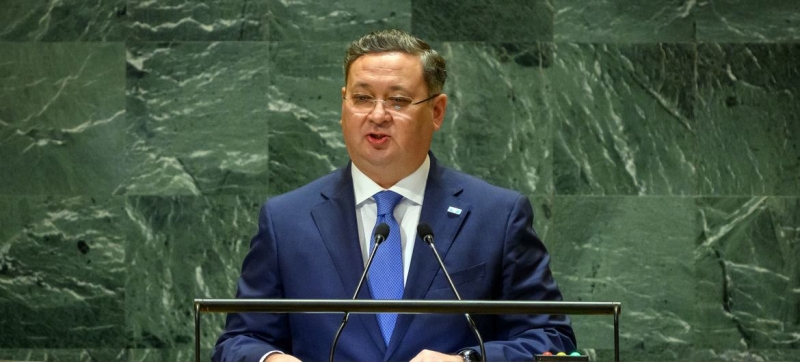
Kazakhstan Foreign Minister Murat Nurtleu at the General Assembly. Kazakh Foreign Minister: We are concerned about the escalation of nuclear threat rhetoric UN
Victims of conflicts around the world, in the Middle East, Eastern Europe and Africa, are in dire straits that deserve immediate, decisive and collective action. But the decision-making process in the UN Security Council is paralyzed. This was stated by the Minister of Foreign Affairs of Kazakhstan Murat Nurtleu from the rostrum of the UN General Assembly.
The need for global reforms and cooperation
He quoted the words of the Secretary-General that this undermines the authority, legitimacy and effectiveness of the Organization as a whole.
“Annual discussions on reforming global institutions are no longer enough. It’s time to make the change that our world so desperately needs,” Nurtleu said.
The Minister recalled that last year, the President of Kazakhstan presented the Initiative of World Unity for a Just Peace and Harmony in the General Assembly hall.
“The voices of middle powers and developing countries are vital to overcome differences and create a more effective international security architecture,” Nurtleu said.
Escalation of the rhetoric of nuclear threats
The Minister noted that the threat of a new nuclear arms race exacerbates the geopolitical polarization.
«Nuclear Disarmament and Non-Proliferation are key pillars of my country’s foreign policy. Kazakhstan is therefore deeply concerned about the escalation of nuclear threat rhetoric. We call on all nuclear-weapon states to join the Treaty on the Non-Proliferation of Nuclear Weapons and the Comprehensive Nuclear-Test-Ban Treaty,” Nurtleu said.
“I also call on those countries that have not yet acceded to the Treaty on the Prohibition of Nuclear Weapons (TPNW) to do so as soon as possible,” he added.
The existential threat of climate change
Another existential threat that no country can afford to ignore is climate change, Nurtleu noted.
The minister called on G20 countries and multilateral development banks to provide “green” technologies and concessional financing for low- and middle-income countries in line with the Paris Agreement.
“Our region is at the forefront of the fight against global warming despite the fact that it accounts for only 1 percent of global emissions. In Central Asia, temperatures will rise above average by 2.5 degrees by 2050,” the head of the Kazakh Foreign Ministry said.
He recalled that Kazakhstan will host the Regional Climate Summit in 2026.
Every fourth person does not have access to safe water
One of the consequences of climate change is water shortages, Nurtleu noted. “Today, every fourth person does not have access to safe drinking water. If this trend continues, more than five billion people could face water shortages by 2050,” he said.
“In Central Asia, water shortages will affect 25 percent to 30 percent of the population by that time,” the minister added.
He said that as the current chairman of the International Fund for Saving the Aral Sea Kazakhstan is working with partners to create a cooperation mechanism for the efficient use of water and energy resources in Central Asia.
Landlocked Countries
As the largest landlocked country, Kazakhstan actively promotes the interests of all such countries, the minister emphasized.
“Despite significant successes, we are still far from implementing the Vienna Programme of Action. We are lagging behind in key indicators, in particular, in the implementation of innovative technologies to simplify trade procedures and the development of transit and transport corridors,” Nurtleu said.
He recalled that today 80 percent of land transit cargo flows between Asia and Europe.
“Kazakhstan is committed to strengthening the synergy between the One Belt, One Road project, the Global Gateway initiative, the North-South corridors and the Trans-Caspian International Transport Route,” Nurtleu noted.
Development of Afghanistan
According to the minister, the regional agenda also includes the issue of developing Afghanistan and turning it into a “stable and predictable state” and a reliable trading partner.
“In this context, the UN Regional Centre for Sustainable Development for Central Asia and Afghanistan in Almaty will be a turning point in the coordinated achievement of the Goals sustainable development,” Nurtleu said.
Human Rights Protection
The Minister spoke about the importance of protecting human rights and stressed that his country has abolished the death penalty, introduced a zero-tolerance policy towards torture and strengthened national preventive mechanisms.
Nurtleu noted that protecting women’s rights and ensuring the safety of children are top priorities for Kazakhstan.
“As one of the leaders in the repatriation of women and children from conflict zones in the Middle East, Kazakhstan will host the International Conference on Best Practices in Repatriation and Reintegration in 2025,” he added.
